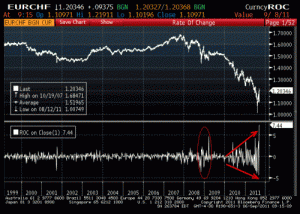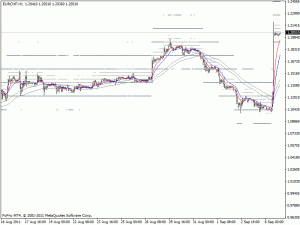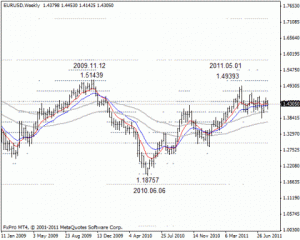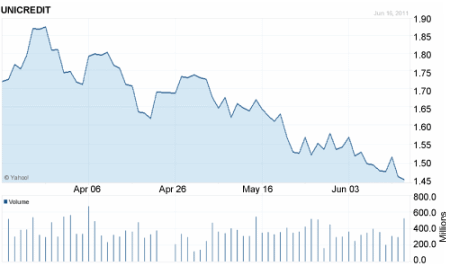Today’s SNB action…
On the Swiss move
Bruce Krasting
I have repeatedly said in these pages [zerohedge — your homepage ?] that for currency intervention to be successful it has to be done in conjunction with other big central banks. The Go it Alone policy has not worked over the past 20 years. I have no reason to expect that it will work this time either.
I think the most important press announcement this AM is not from the SNB; it is from the ECB. There is little doubt from this that the SNB is in this all alone:
The Governing Council of the European Central Bank has been informed by the Swiss National Bank about its decision to “no longer tolerate a EUR/CHF exchange rate below the minimum rate of CHF 1.20.”
The Governing Council takes note of this decision, which has been taken by the Swiss National Bank under its own responsibility.
I think that the SNB has just committed suicide. They did the one thing they should never have done. Draw a line in the sand.
Events far outside of the control of the SNB will determine the consequences of the policy to put a floor under the CHF. While I don’t doubt their short-term resolve to defend the 1.20 level for the EURCHF I am already questioning how long this can continue. Some thoughts on where this may go.
Stay away from the CHF. There is only one trade to make as of this morning. That would be long the EURCHF. To me that is like shorting gold. Don’t do it, is my advice.
This has been tried before by the SNB way back in the late 70’s. As a currency matter the policy was a success. The Franc stabilized against the weak German Mark. But three years later the Swiss were suffering a massive hangover. Inflation went from a negligible number to over 7%. There can be no doubt but that the same results will happen again. It’s just a matter of time.
Stay away from Swiss stocks for the time being. Yes, a cheaper Franc is good for translated earnings. So if you believe that multiples are the only driver of stock prices you might conclude that the move by the SNB makes the SMI (stock index) a buy. Think again. A government that falls back on currency controls as the only measure of policy options left, is a place that you don’t want to put your money. The big jump in Swiss stocks this AM is a logical knee jerk response. But the SNB move is also the kiss of death for the equity markets in Switzerland.
Europe is falling apart. That reality has not changed as a result of the SNB action. Over the next few weeks we will get more bad news from the EU. In the past the ‘go to’ response has been to buy the Yen and CHF as a safe haven knee jerk reaction. Now that trade is dead (both of them in my opinion). So where will the hot money go the next time the headlines scare capital? There is only one choice left now. That would be gold.
I believe that the amount of intervention required to drive the EURCHF from 1.14 to 1.20 this AM was quite small. The market immediately re-priced the currency to the level the SNB said it was prepared to defend. But that is not going to be the result at some time in the near future. At some point the SNB will be tested. I have no doubt but that they will step up and intervene like mad the next time the CHF is in demand. But at what cost? How many Euros will they be forced to absorb? E100b? E300b? Could it go as high as E1 trillion? There is no number that can’t be achieved. The question of, “How much can they do?” has not been asked or answered as yet. The market is going to both ask and answer that question. I think the time frame for this is before the end of this year.
Do the Swiss have the will to take this fight to the bitter end? There is nothing in history that says that they can or will. What if this begins to backfire sometime this fall? Does the SNB just stand there and print Francs? That is what they have said they will do. I wonder what they will be thinking when the money supply first doubles, then triples then just goes vertical. Are they really so stupid to think that the floor on the Franc has no risk attached to it?
In 2010 the SNB reported a loss of CHF 21b as a result of their failed interventions against the Euro that left them holding the bag. There was political hell to pay for these losses. The annual gains of the SNB are paid back to the Cantons. There will be no gains (only losses) as a result of the new policy. The Swiss exporters, farmers, tourist industry may hail the move today, but just wait till the policy fails. Before this is over the SNB will hold an extra 500b Euros. The losses could easily exceed E50b. This will sink the SNB forever.
What will the SNB do with all the Euros they have promised to buy? That’s easy to answer. Only German and French debt will be allowed. This will just result in a widening of credit spreads between the North and the South. As this happens more capital will seek a safe haven. What the Swiss have done will add to the instability within the EU. As a result, the ECB will hate the SNB.
To some extent the strong CHF was a dollar phenomenon. The CHF got stronger and stronger against the Euro. Through the markets this acted as a support for the Euro versus the dollar. What might it mean now that this relief valve has been broken? One possible response is that the dollar gets stronger in a significant way. That has not been the reaction so far this morning, but I consider this to be a reasonable outcome. Just a question for those who are looking at this from a global perspective:
What is the number one worst thing that could happen to the US economy over the next six months?
I would put a “too strong” dollar at the top of my list. Should the result of the SNB action be a 10-15% up move in the dollar versus Euro it will be the kiss of death for US GDP. I think there is a very good case for this to occur. Bernanke must be very upset this AM. What the Swiss have done runs very counter to his plan to “export” US deflation. The Swiss are now going to be the exporters of deflation. The bulk of this will stay in the EU, but some of it surely will come to our shores. If your odds for a USA double dip were 50-50 on Friday, they just went to 70-30.
How much intervention can the world absorb? Japan is doing it big time in both the currency and debt markets. China is manipulating its FX and interest rates. The USA is manipulating interest rates in an unprecedented way. Brazil, Russia, Korea are all doing the same. It won’t work folks. It will fail. The Central Banks are not omnipotent. The markets are.
I suppose there is a soft landing scenario to the steps taken today by the SNB. The liquidity problems in the credit markets of Europe could somehow magically stabilize. It’s possible that the debt woes of the PIIGS could also disappear from the market’s radar. It’s conceivable that US growth could perk up and a crisis is avoided.
I don’t see any of those things happening any time soon. I say the SNB move will fail at some point. If/when that happens it will be an important point in history. If we see the headline, “Swiss cave to market – Franc soars” that will be the day that marks the end game of “extend and pretend” policies and market manipulation. That will be the day that the Great Depression of the new millennium begins. What we went through in 2008 will be a walk in the park compared to that turning point.
I wrote about the prospects of a CHF Peg a few times in the past month or two. I think the steps taken today represent a huge gamble by the SNB. I said of the prospects for this to happen:
The Swiss like to “Double Down”The SNB has, in fact, doubled down as of this morning. This is the biggest financial bet in the country’s long history. They are “All In” on this bet. Not only are they betting Switzerland’s economic future, they have also placed a bet for the other 7 billion people living on the planet. I would give a “zero’ possibility for this to work. Get your seat belts on. Volatility is about to take another monstrous leap.



